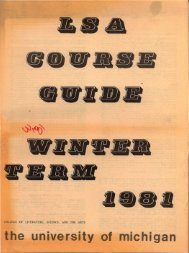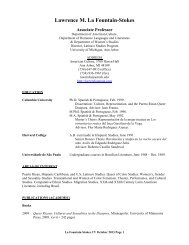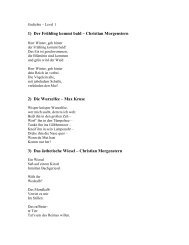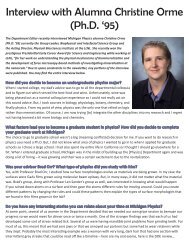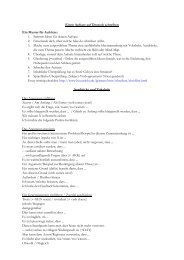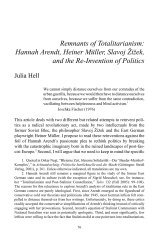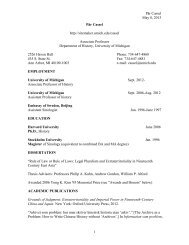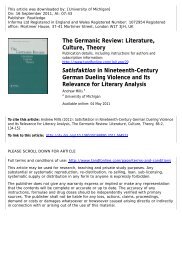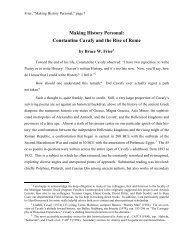Remember the Hand: Bodies and Bookmaking in Early Medieval ...
Remember the Hand: Bodies and Bookmaking in Early Medieval ...
Remember the Hand: Bodies and Bookmaking in Early Medieval ...
You also want an ePaper? Increase the reach of your titles
YUMPU automatically turns print PDFs into web optimized ePapers that Google loves.
Downloaded by [ca<strong>the</strong>r<strong>in</strong>e brown] at 13:48 24 October 2011<br />
of Seville. 40 Only after this elaborate fram<strong>in</strong>g does Gregory’s own <strong>in</strong>troduction<br />
beg<strong>in</strong> (f. 16v), <strong>and</strong> once we have paged through Gregory’s prefaces, <strong>the</strong><br />
elaborate fram<strong>in</strong>g of MS 80 opens up its fullest sense.<br />
In <strong>the</strong> open<strong>in</strong>g Letter to Le<strong>and</strong>er of Seville, Gregory describes <strong>the</strong> circumstances---<strong>and</strong><br />
mechanics---of <strong>the</strong> Moralia’s production, from oral commentary<br />
to a writ<strong>in</strong>g-attentive revision, based on notes taken by hearers <strong>and</strong> dictated to<br />
a wait<strong>in</strong>g scribe, end<strong>in</strong>g, f<strong>in</strong>ally, with <strong>the</strong> thirty-five-book commentary that<br />
<strong>the</strong> letter purports to present as a gift to <strong>the</strong> Sevillian bishop.<br />
I expounded <strong>the</strong> first parts of <strong>the</strong> book <strong>in</strong> talks for <strong>the</strong> assembled brethren <strong>and</strong><br />
<strong>the</strong>n, because I found my time a little freer, I dictated my exposition of <strong>the</strong> rest of<br />
<strong>the</strong> book. Later, when <strong>the</strong>re was more time, I went back revis<strong>in</strong>g all that had<br />
been taken down <strong>in</strong> my presence as I spoke <strong>in</strong>to books, add<strong>in</strong>g much new<br />
material, tak<strong>in</strong>g away a little, <strong>and</strong> leav<strong>in</strong>g a fair amount as it was.<br />
[eisdem coram positis fratribus priora libri sub oculis dixi et, quia tempus<br />
paulo uacantius repperi, posteriora tract<strong>and</strong>o dictaui, cum que mihi spatia<br />
largiora suppeterent, multa augens pauca subtrahens atque ita, ut <strong>in</strong>uenta<br />
sunt, nonnulla derel<strong>in</strong>quens ea, quae me loquente excepta sub oculis fuerant,<br />
per libros emend<strong>and</strong>o composui] 41<br />
As Florentius’s prefatory material grounds his codex of <strong>the</strong> Moralia <strong>in</strong> its<br />
editorial <strong>and</strong> scribal transmission (Taio’s letter, <strong>the</strong> story of how he found<br />
<strong>the</strong> autograph Moralia, Florentius’s labyr<strong>in</strong>th <strong>and</strong> colophons), so Gregory’s<br />
<strong>in</strong>troductions ground <strong>the</strong> Moralia <strong>in</strong> <strong>the</strong> circumstances of its own composition,<br />
<strong>and</strong> <strong>in</strong> <strong>the</strong> very particular <strong>and</strong> bodily experience of <strong>the</strong> ‘‘I’’ who composed it.<br />
Though by his own account, Gregory made books by dictation <strong>and</strong> not by<br />
h<strong>and</strong>, his engagement with text was anyth<strong>in</strong>g but disembodied. 42 <strong>Early</strong> <strong>in</strong> <strong>the</strong><br />
letter to Le<strong>and</strong>er of Seville that <strong>in</strong>troduces <strong>the</strong> Moralia, Gregory expla<strong>in</strong>s:<br />
‘‘Many years have now run <strong>the</strong>ir course while I have been troubled by<br />
frequent disorders of <strong>the</strong> stomach. I am bo<strong>the</strong>red at all hours by weakness<br />
from <strong>the</strong> enfeebl<strong>in</strong>g of my digestion, <strong>and</strong> I struggle to draw breath <strong>in</strong> <strong>the</strong> midst<br />
of mild but constant fevers’’ [‘‘Multa quippe annorum iam curricula deuoluuntur,<br />
quod crebris uiscerum doloribus crucior, horis momentis que omnibus<br />
fracta stomachi uirtute lassesco, lentis quidem, sed tamen cont<strong>in</strong>uis<br />
febribus anhelo’’]. 43 Lest his reader take this statement as mere confession<br />
or compla<strong>in</strong>t, Gregory moralizes: ‘‘perhaps this was <strong>the</strong> div<strong>in</strong>e plan, that <strong>in</strong><br />
my trials I should tell of <strong>the</strong> trials of Job <strong>and</strong> that I would better underst<strong>and</strong> <strong>the</strong><br />
m<strong>in</strong>d of one so scourged if I felt <strong>the</strong> lash myself.’’ [‘‘fortasse hoc diu<strong>in</strong>ae<br />
prouidentiae consilium fuit, ut percussum iob percussus exponerem, et flagellati<br />
mentem melius per flagella sentirem’’]. 44 So <strong>the</strong> vivid description of<br />
Gregory’s physical distress has as much of hermeneutics as it does of confession.<br />
So too, <strong>in</strong> <strong>the</strong> clos<strong>in</strong>g bracket of <strong>the</strong> Moralia, where, after thirty-five<br />
books’ worth of <strong>in</strong>timate engagement with <strong>the</strong> book of Job, Gregory turns <strong>in</strong><br />
once aga<strong>in</strong> to represent <strong>the</strong> effect of that engagement on this (very<br />
August<strong>in</strong>ian) read<strong>in</strong>g <strong>and</strong> writ<strong>in</strong>g self:<br />
Now that this work is f<strong>in</strong>ished, I see that I must return to myself. For, even when<br />
it attempts to speak rightly, our m<strong>in</strong>d is scattered outside itself. For words are<br />
thought of <strong>and</strong> expressed, <strong>the</strong>y dim<strong>in</strong>ish <strong>the</strong> <strong>in</strong>tegrity of <strong>the</strong> soul because <strong>the</strong>y<br />
draw it out of itself . . . Therefore I beg that anyone who reads this lay out <strong>the</strong><br />
solace of his prayer for me before <strong>the</strong> strict judge, <strong>and</strong> that all he f<strong>in</strong>ds sordid <strong>in</strong><br />
me might be cleansed by his tears. When I compare <strong>the</strong> virtue of his prayer with<br />
276 CATHERINE BROWN<br />
40 – For details of <strong>the</strong> contents of Biblioteca<br />
Nacional de España MS 80, see <strong>the</strong> entry <strong>in</strong><br />
Martín de la Torre <strong>and</strong> Pedro Longás,<br />
Catálogo de códices lat<strong>in</strong>os. I. Bíblicos (Madrid:<br />
Patronato de la Biblioteca Nacional, 1935).<br />
Díaz y Díaz (‘‘Gregorio Magno y Tajón de<br />
Zaragoza’’) offers a fuller discussion of this<br />
paratextual dossier <strong>in</strong> early medieval Iberian<br />
manuscripts of <strong>the</strong> Moralia.<br />
41 – Moralia, Ad Le<strong>and</strong>rum 2, ed. Adriaen,<br />
vol. 143: p. 3; trans. O’Donnell, available<br />
onl<strong>in</strong>e at http://www9.georgetown.edu/<br />
faculty/jod/texts/moralia1.html (accessed 14<br />
January 2011). This characteristic preoccupation<br />
with textual transmission receives visual<br />
<strong>and</strong> narrative form <strong>in</strong> <strong>the</strong> iconographic tradition<br />
of ‘‘The Inspiration of Gregory,’’ <strong>in</strong><br />
which Gregory’s scribe peeks through <strong>the</strong><br />
curta<strong>in</strong> separat<strong>in</strong>g him from his dictat<strong>in</strong>g<br />
master, <strong>and</strong> sees <strong>the</strong> sa<strong>in</strong>tly Pope receiv<strong>in</strong>g his<br />
dictation from <strong>the</strong> Holy Spirit. The most<br />
strik<strong>in</strong>g image---also 10 th c.---is perhaps <strong>in</strong><br />
Hartker’s Antiphoner (c. 990-1000 CE), St<br />
Gall Stiftsbibl. 390, p. 13, now available onl<strong>in</strong>e<br />
at http://www.e-codices.unifr.ch/en/csg/<br />
0390/13 (accessed 2 September 2010). For<br />
more, see Camille, ‘‘Gregorian Def<strong>in</strong>ition<br />
Revised,’’ p. 92; Andrea Budgey <strong>and</strong> R<strong>and</strong>all<br />
A. Rosenfeld, ‘‘The Portrait of <strong>the</strong> Music<br />
Scribe <strong>in</strong> Hartker’s Antiphoner’’ <strong>in</strong> Pen <strong>in</strong><br />
<strong>H<strong>and</strong></strong>, ed. Gullick, pp. 19-30.<br />
42 – The visual tradition flouts Gregory’s<br />
warn<strong>in</strong>g as much as <strong>the</strong> scribal tradition<br />
does---Conrad Rudolph notes that <strong>the</strong><br />
Cîteaux Moralia (Dijon, Bibliothèque<br />
Municipale MSS 168, 169, 170, 173) conta<strong>in</strong>s<br />
an <strong>in</strong>itial pa<strong>in</strong>t<strong>in</strong>g of Job writ<strong>in</strong>g <strong>the</strong> book of<br />
‘‘Job’’ (Violence <strong>and</strong> Daily Life: Read<strong>in</strong>g, Art, <strong>and</strong><br />
Polemics <strong>in</strong> <strong>the</strong> Cîteaux ‘‘Moralia In Job’’<br />
[Pr<strong>in</strong>ceton, N.J.: Pr<strong>in</strong>ceton University Press,<br />
1997], fig. 7). A manuscript of Moralia c. 1170-<br />
75 from Frankendahl shows Gregory himself<br />
as <strong>the</strong> <strong>in</strong>itial I <strong>in</strong> ‘‘igitur,’’ pen <strong>in</strong> h<strong>and</strong>, at work<br />
on <strong>the</strong> follow<strong>in</strong>g letter G (Michael Gullick,<br />
‘‘Self-Referential Artist <strong>and</strong> Scribe Portraits<br />
<strong>in</strong> Romanesque Manuscripts,’’ <strong>in</strong> Pen <strong>in</strong> <strong>H<strong>and</strong></strong>,<br />
ed. Gullick, fig. 13).<br />
43 – Moralia, Ad Le<strong>and</strong>rum V; ed. Adriaen,<br />
vol. 143, p. 6; trans. O’Donnell, available<br />
onl<strong>in</strong>e at http://www9.georgetown.edu/<br />
faculty/jod/texts/moralia1.html (accessed 14<br />
January 2011).<br />
44 – Moralia, Ad Le<strong>and</strong>rum V; ed. Adriaen,<br />
vol. 143, p. 6; trans. James J. O’Donnell,<br />
available onl<strong>in</strong>e at http://www9.georgetown.edu/faculty/jod/texts/moralia1.html<br />
(accessed 14 January 2011). For Gregory’s<br />
explicit identification with suffer<strong>in</strong>g <strong>in</strong> Job<br />
<strong>and</strong> Ezekiel, see Carole Ellen Straw, Gregory<br />
<strong>the</strong> Great: Perfection <strong>in</strong> Imperfection, (Berkeley,<br />
Calif.: University of California Press, 1988),<br />
184-85.





